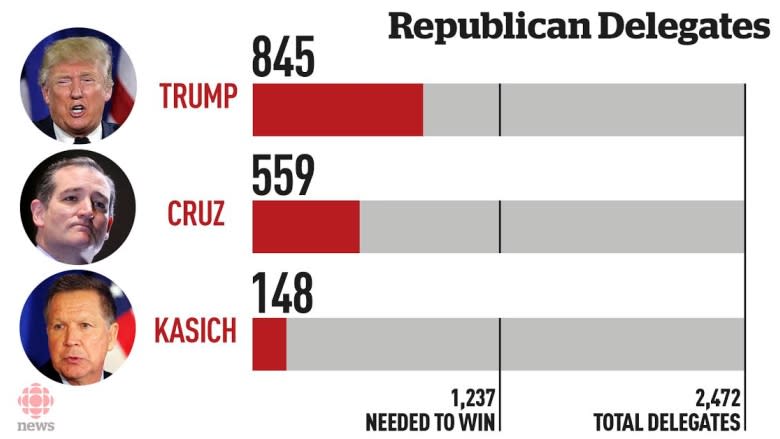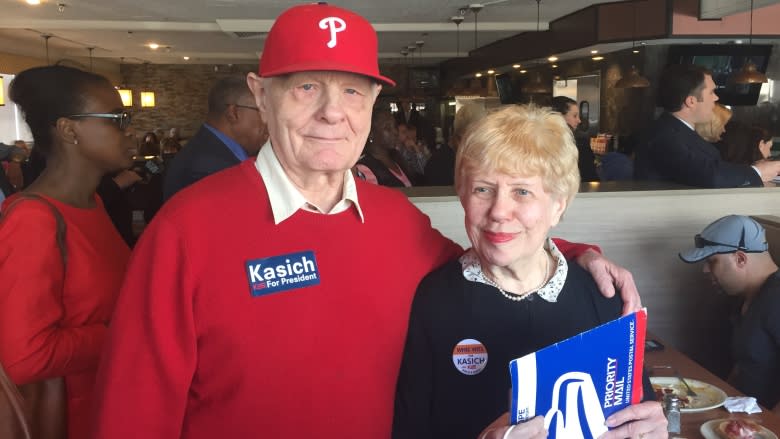Ted Cruz-John Kasich deal may hurt more than just Trump
LIVE COVERAGE: CBCNews.ca will be liveblogging Tuesday night's U.S. presidential primary results and will livestream all the candidates' speeches from the five state contests.
It's a calculated plan with some calculated risk.
Working against delegate math and the primary calendar, Ted Cruz and John Kasich have formed an unusual alliance, a last-gasp ceasefire so they can double up efforts to sink Donald Trump's presidential ambitions.
But could it backfire?
Political observers warn the partnership threatens to weaken Cruz's anti-establishment image and Kasich's positive "happy warrior" narrative, just days before a crucial Indiana primary.
The collaboration to peel away delegates before Trump can amass the 1,237 he needs to clinch the nomination also risks fuelling resentment toward the prickly processes and legal manoeuvres used to manipulate the Republican nomination process.
"This reminds people about everything they hate about politics," Roger Stone, Trump's former senior campaign adviser, said Monday in Washington.
The Cruz-Kasich partnership "puts the lie to the idea that Ted Cruz isn't an insider," he said.
Asked how the development reflects on the current state of the Republican Party, Stone said uncommitted conservatives were becoming convinced the nomination system is "rigged" to favour conventional politicians.
"This just identifies Cruz as what he is, the establishment candidate. And he's teaming up with the most liberal candidate in the race," Stone added, referring to Kasich, the Ohio governor, who has better traction among moderate Republicans.
Kasich and Cruz, a Texas senator, released co-ordinated statements Sunday night committing to clear each other's paths to states in which either opponent stands a better chance at taking on Trump.
The objective is to stop Trump from accruing any more delegates toward the 1,237 he needs ahead of the Republican convention in Cleveland in July.
For Kasich, that means staying out of Indiana, where a strong base of working-class white evangelicals might identify on a deeper level with Cruz's views when they vote in next Tuesday's primary.
#NeverTrump movement 'very encouraged'
For Cruz, that means holding off on campaigning in New Mexico for the June 7 primary and Oregon on May 17, western states that are friendlier to Kasich.
Both candidates have economic cases for focusing on states they have better chances in.
Trump wasted little time punching back, with a tweet on Sunday night slamming the pact as "desperate" and telling supporters at a rally in Rhode Island, "It shows how weak they are, it shows how pathetic they are."
Rory Cooper, a Republican strategist and senior adviser to the #NeverTrump movement, begs to differ.
"This is a sign of using your campaign resources strategically to get yourself to a position to win," he said.
"We're very encouraged by this. People who buy into the idea [that the plan would backfire] are already firmly in a camp that's not going to be persuadable."
'Too little too late'?
Although the Cruz-Kasich plan might work, "it's certainly the last possible opportunity for those concerned about a Donald Trump presidency," said Elizabeth Bennion, a political science professor at Indiana University South Bend.
"The question of whether this is all too little, too late remains an open question."
Trump, long seen as the ultimate Republican bully, now finds himself in the middle of a game of political keep-away.
"But if voters get that message that these candidates don't care about the will of the voters but want to protect the party above all else, it could backfire," Bennion said. "A weak Trump supporter could become a stronger Trump supporter."
The billionaire real-estate magnate has racked up 845 delegates so far, followed by 559 for Cruz and 148 delegates pledged to Kasich, according to an Associated Press tally.
Indiana's haul of 57 delegates makes it potentially the last bastion before California. If Trump wins there, Bennion said, it's practically game over.
"Both Mr. Cruz's and Mr. Kasich's campaigns have finally realized that this is the case, and they absolutely need to divide and conquer," Bennion said.
Whether voters will understand what's being asked of them is another matter. The Ohio governor didn't make things much clearer on Monday morning.
At a diner in Philadelphia, Kasich stopped short of encouraging his supporters to direct their votes toward Cruz.
"I've never told them not to vote for me. They ought to vote for me," Kasich said.
That kind of statement, Bennion believes, only muddies the message.
"It becomes difficult to convince voters they should not vote for their preferred candidate," she said, adding that SuperPACs would be depended upon to play along and halt their anti-Cruz or anti-Kasich attack ads, without direct instruction from the campaigns they support.
'Happy warrior' image compromised
Political writer Sasha Issenberg, author of The Victory Lab: The Secret Science of Winning Campaigns, questioned whether the way that Cruz and Kasich have sought to define their candidacies as special might lose some impact.
Cruz, for example, has declared himself the only viable alternative to Trump, while Kasich has repeatedly referred to national polls suggesting he is the Republican candidate with the best chance of defeating Democratic frontrunner Hillary Clinton in a general election.
"Suddenly, they've sacrificed their claims about their unique viability in this race by partnering with someone else," Issenberg said.
He said Kasich, who has cast himself as the "happy warrior" who steers clear of viciously attacking Trump, might also see that image get compromised.
California will be the next big test if Indiana doesn't work out. The 53 congressional districts are awarded proportionally based on a statewide vote, and splitting the state map for another divide-and-conquer strategy would be an ambitious undertaking.
"They could come up with 53 non-aggression pacts," Issenberg suggested.
That kind of planning may sound desperate to a Trump supporter, but not to Bobbi Shawfner, a Kasich supporter in Philadelphia.
"I think it's great. Anything that's going to get rid of Trump," Shawfner said. She and her husband, Henry, brushed off Trump's suggestion the tactic was an act of desperation.
"No, no, I think it's realistic," she said. "And we hope it works."



